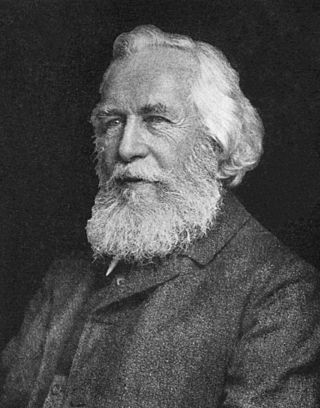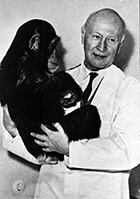Related Research Articles

Darwinism is a theory of biological evolution developed by the English naturalist Charles Darwin (1809–1882) and others, stating that all species of organisms arise and develop through the natural selection of small, inherited variations that increase the individual's ability to compete, survive, and reproduce. Also called Darwinian theory, it originally included the broad concepts of transmutation of species or of evolution which gained general scientific acceptance after Darwin published On the Origin of Species in 1859, including concepts which predated Darwin's theories. English biologist Thomas Henry Huxley coined the term Darwinism in April 1860.

Ernst Heinrich Philipp August Haeckel was a German zoologist, naturalist, eugenicist, philosopher, physician, professor, marine biologist and artist. He discovered, described and named thousands of new species, mapped a genealogical tree relating all life forms and coined many terms in biology, including ecology, phylum, phylogeny, and Protista. Haeckel promoted and popularised Charles Darwin's work in Germany and developed the influential but no longer widely held recapitulation theory claiming that an individual organism's biological development, or ontogeny, parallels and summarises its species' evolutionary development, or phylogeny.

Neo-Darwinism is generally used to describe any integration of Charles Darwin's theory of evolution by natural selection with Gregor Mendel's theory of genetics. It mostly refers to evolutionary theory from either 1895 or 1942, but it can mean any new Darwinian- and Mendelian-based theory, such as the current evolutionary theory.

August Friedrich Leopold Weismann FRS (For), HonFRSE, LLD was a German evolutionary biologist. Fellow German Ernst Mayr ranked him as the second most notable evolutionary theorist of the 19th century, after Charles Darwin. Weismann became the Director of the Zoological Institute and the first Professor of Zoology at Freiburg.

The modern synthesis was the early 20th-century synthesis of Charles Darwin's theory of evolution and Gregor Mendel's ideas on heredity into a joint mathematical framework. Julian Huxley coined the term in his 1942 book, Evolution: The Modern Synthesis.

Lamarckism, also known as Lamarckian inheritance or neo-Lamarckism, is the notion that an organism can pass on to its offspring physical characteristics that the parent organism acquired through use or disuse during its lifetime. It is also called the inheritance of acquired characteristics or more recently soft inheritance. The idea is named after the French zoologist Jean-Baptiste Lamarck (1744–1829), who incorporated the classical era theory of soft inheritance into his theory of evolution as a supplement to his concept of orthogenesis, a drive towards complexity.

Sir Edwin Ray Lankester was a British zoologist.

Bernhard Rensch was a German evolutionary biologist and ornithologist who did field work in Indonesia and India. Starting his scientific career with pro-Lamarckian views, he shifted to selectionism and became one of the architects of the modern synthesis in evolutionary biology, which he popularised in Germany. Besides his work on how environmental factors influenced the evolution of geographically isolated populations and on evolution above the species level, which contributed to the modern synthesis, he also worked extensively in the area of animal behavior (ethology) and on philosophical aspects of biological science. His education and scientific work were interrupted by service in the German military during both World War I and World War II.
Devolution, de-evolution, or backward evolution is the notion that species can revert to supposedly more primitive forms over time. The concept relates to the idea that evolution has a purpose (teleology) and is progressive (orthogenesis), for example that feet might be better than hooves or lungs than gills. However, evolutionary biology makes no such assumptions, and natural selection shapes adaptations with no foreknowledge of any kind. It is possible for small changes to be reversed by chance or selection, but this is no different from the normal course of evolution and as such de-evolution is not compatible with a proper understanding of evolution due to natural selection.

Frank Lewis Marsh was an American Seventh-Day Adventist biologist, educator and young Earth creationist. In 1963 he was one of the ten founding members of the Creation Research Society.

Oscar Hertwig was a German embryologist and zoologist known for his research in developmental biology and evolution. Hertwig is credited as the first man to observe sexual reproduction by looking at the cells of sea urchins under the microscope.
Prof David Meredith Seares Watson FRS FGS HFRSE LLD was the Jodrell Professor of Zoology and Comparative Anatomy at University College, London from 1921 to 1951.

Sir Edward Bagnall Poulton, FRS HFRSE FLS was a British evolutionary biologist, a lifelong advocate of natural selection through a period in which many scientists such as Reginald Punnett doubted its importance. He invented the term sympatric for evolution of species in the same place, and in his book The Colours of Animals (1890) was the first to recognise frequency-dependent selection. Poulton is also remembered for his pioneering work on animal coloration. He is credited with inventing the term aposematism for warning coloration, as well as for his experiments on 'protective coloration' (camouflage). Poulton became Hope Professor of Zoology at the University of Oxford in 1893.

Vernon Lyman Kellogg was an American entomologist, evolutionary biologist, and science administrator. He established the Department of Zoology at Stanford University in 1894, and served as the first permanent secretary of the National Research Council in Washington, DC.
Hindus have found support for, or ideas foreshadowing evolutionary ideas, in scriptures, such as the mytheme of Dashavatara, the incarnations of Vishnu starting with a fish.
Charles Otis Whitman was an American zoologist, who was influential to the founding of classical ethology. A dedicated educator who preferred to teach a few research students at a time, he made major contributions in the areas of evolution and embryology of worms, comparative anatomy, heredity, and animal behaviour. He was known as the "Father of Zoology" in Japan.
Ivan Ivanovich Schmalhausen was a Ukrainian, Russian and later Soviet zoologist and evolutionary biologist of German descent. He developed the theory of stabilizing selection, and took part in the development of the modern evolutionary synthesis.

Julian Huxley used the phrase "the eclipse of Darwinism" to describe the state of affairs prior to what he called the "modern synthesis". During the "eclipse", evolution was widely accepted in scientific circles but relatively few biologists believed that natural selection was its primary mechanism. Historians of science such as Peter J. Bowler have used the same phrase as a label for the period within the history of evolutionary thought from the 1880s to around 1920, when alternatives to natural selection were developed and explored—as many biologists considered natural selection to have been a wrong guess on Charles Darwin's part, or at least to be of relatively minor importance.
Transformed cladistics, also known as pattern cladistics is an epistemological approach to the cladistic method of phylogenetic inference and classification that makes no a priori assumptions about common ancestry. It was advocated by Norman Platnick, Colin Patterson, Ronald Brady and others in the 1980s, but has few modern proponents. The book, Foundations of Systematics and Biogeography by David Williams and Malte Ebach provides a thoughtful history of the origins of this point of view.

Der Begriff des Instinktes einst und jetzt is a book written by Heinrich Ernst Ziegler. Its first edition was published in the Zoologische Jahrbücher, Supplement VII in 1904. The second edition, published 1910 by Gustav Fisher in Jena and third edition, published in 1920 under the same publisher both received several extensions. The book is about the history of the concept instinct and the different conceptions of the animal psyche throughout history, as well as the understanding of these concepts at the time the book was published. Furthermore, it discusses the implications of Charles Darwin's theory of common descent for comparative psychology.
References
- 1 2 3 4 Debus, Allen G. (1968). World Who's Who in Science: A Biographical Dictionary of Notable Scientists from Antiquity to the Present, Volume 2. Marquis-Who's Who Incorporated. p. 577
- 1 2 Churchill, Frederick B. (2015). August Weismann: Development, Heredity, and Evolution. Harvard University Press. p. 668. ISBN 978-0-674-73689-4
- ↑ Numbers, Ronald L. (2006). The Creationists: From Scientific Creationism to Intelligent Design . Harvard University Press. p. 52. ISBN 0-674-02339-0.
- ↑ Kellogg, Vernon L. (1907). Darwinism To-Day. Henry Holt and Company. p. 8
- ↑ Scott, William Berryman. (1921). The Theory of Evolution, With Special Reference to the Evidence Upon Which it is Founded. The Macmillan Company. p. 2
- 1 2 Numbers, Ronald L. (1995). Creationism in Twentieth-Century America: A Ten-Volume Anthology of Documents, 1903–1961. Volume 9: Early Creationist Journals. Garland Publishing. pp. 111-112. ISBN 0-8153-1810-3